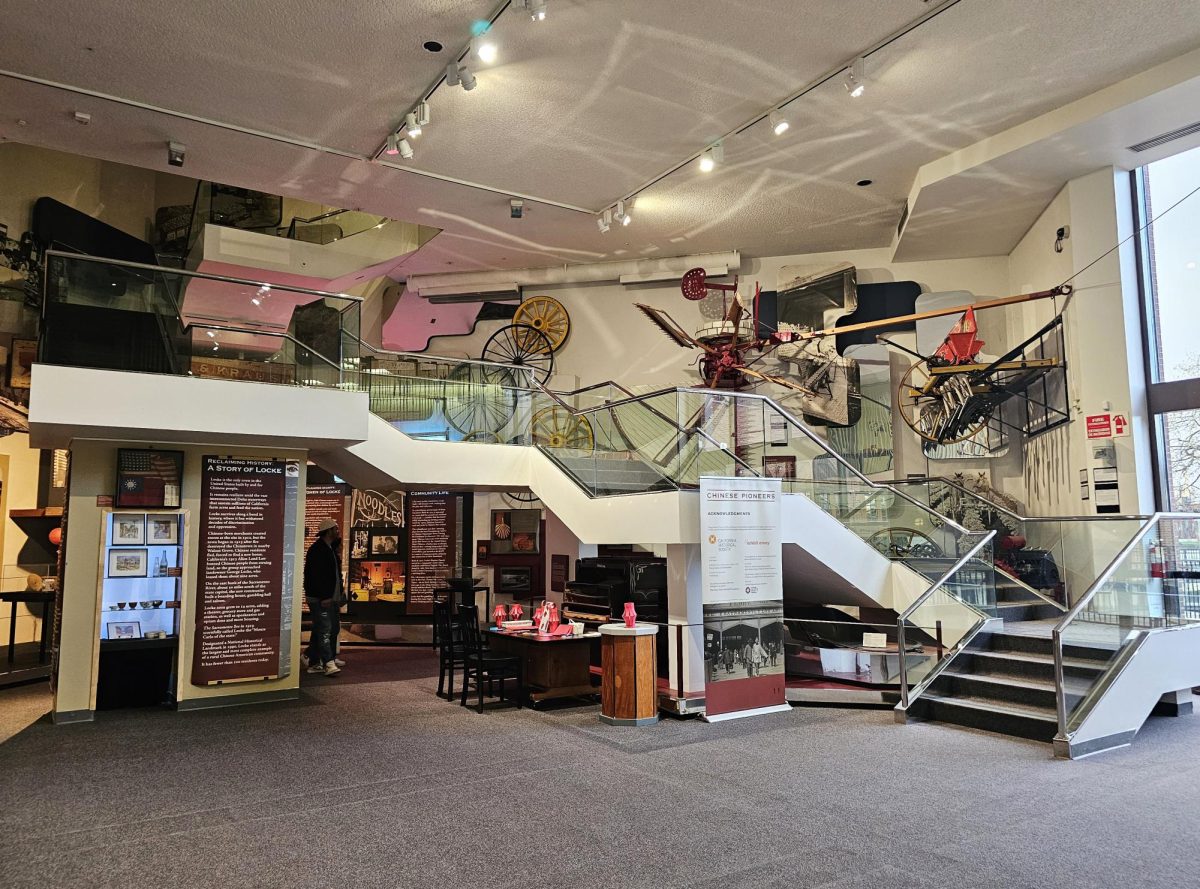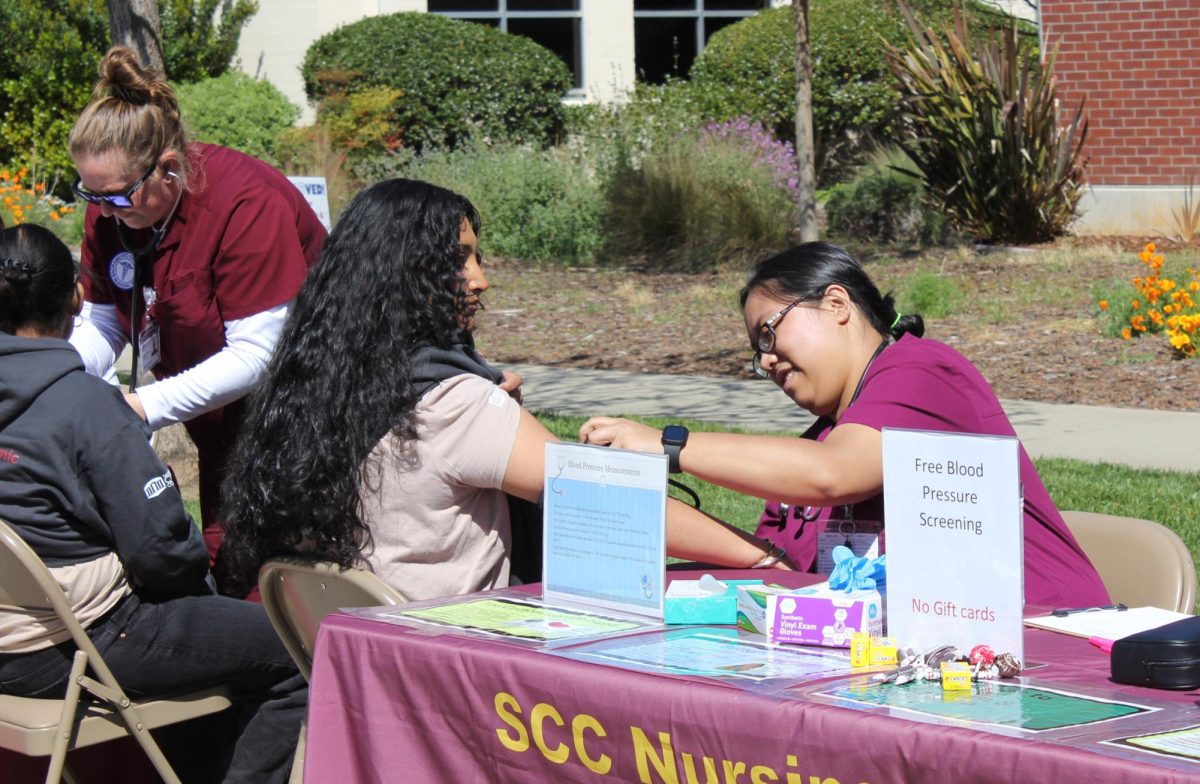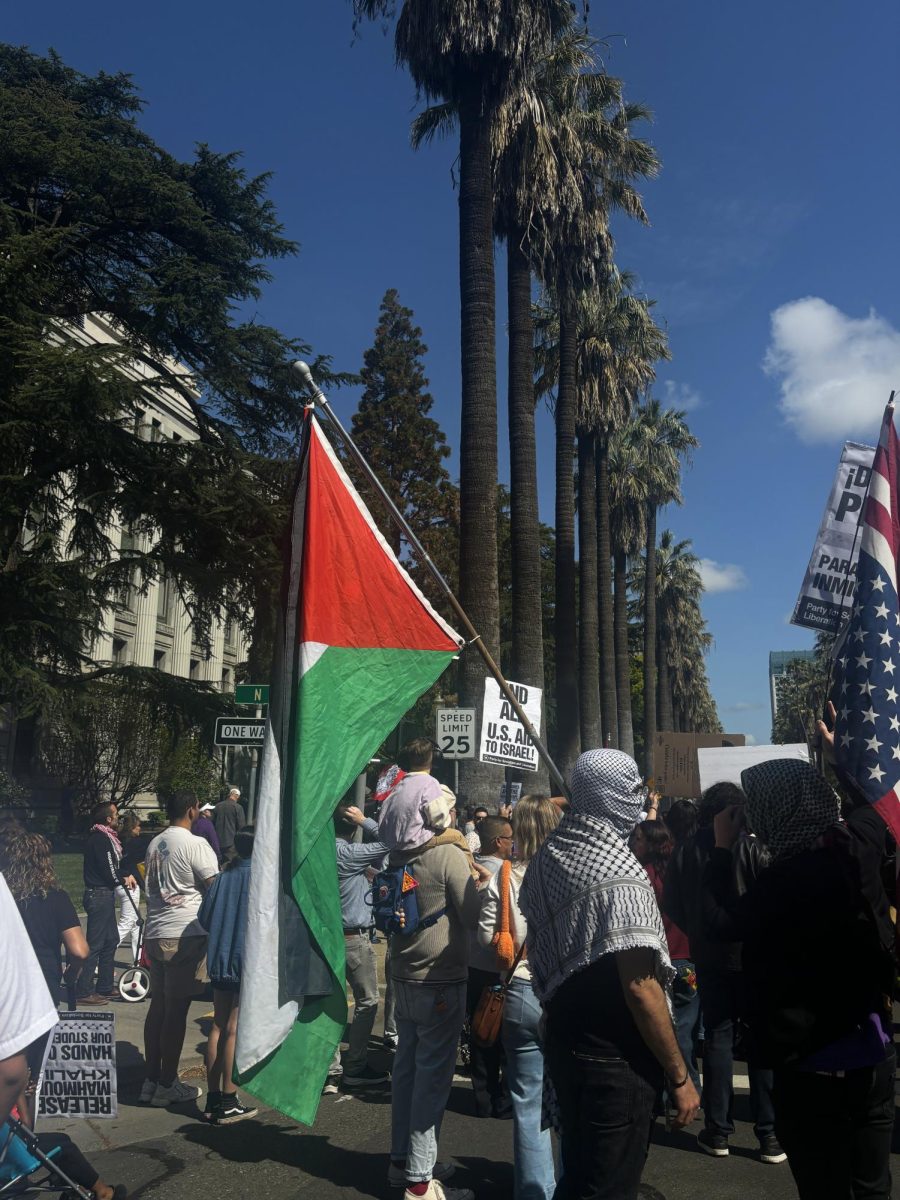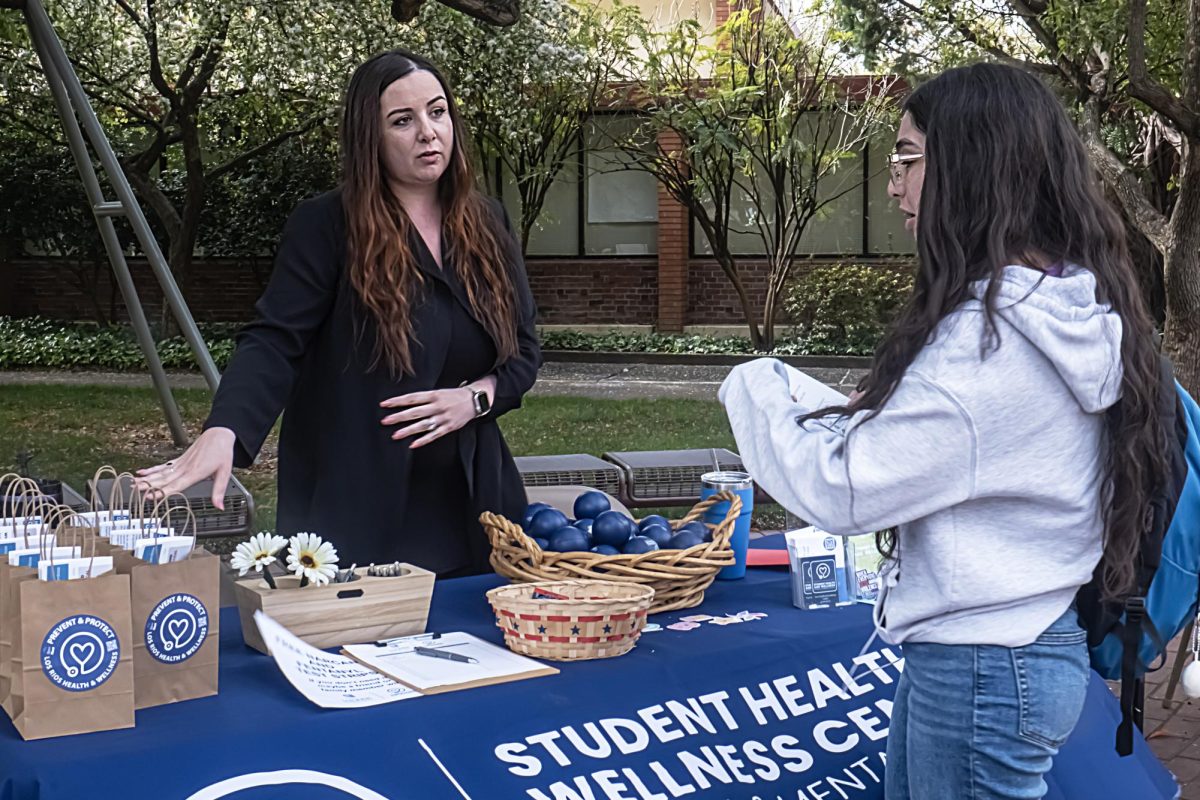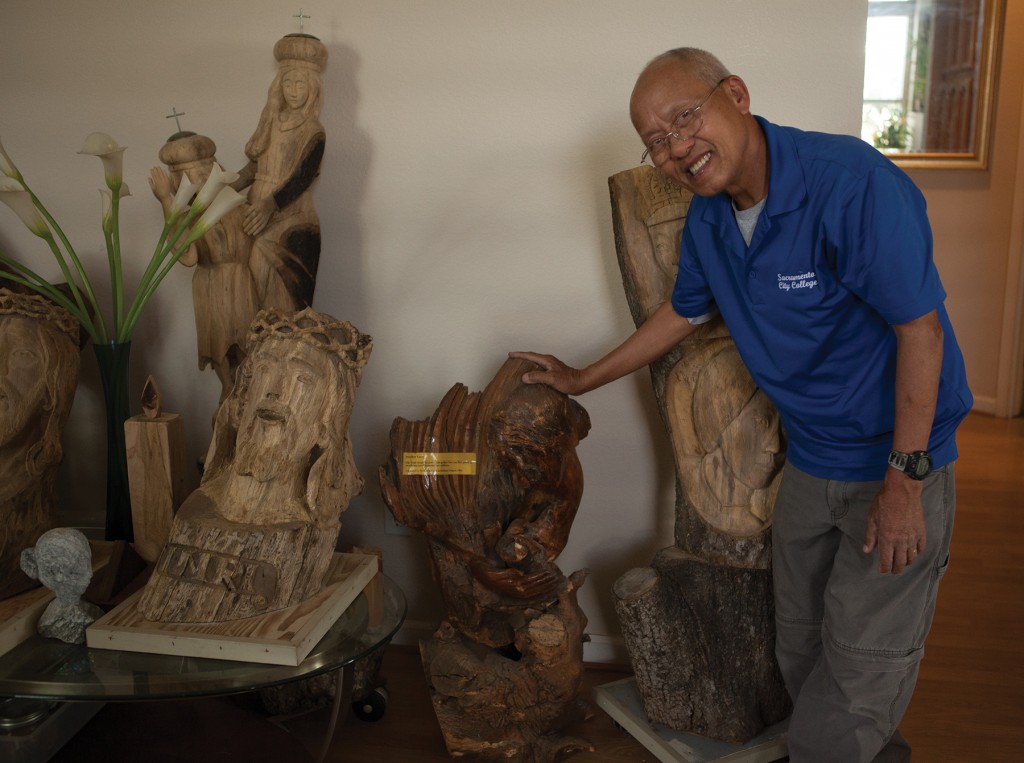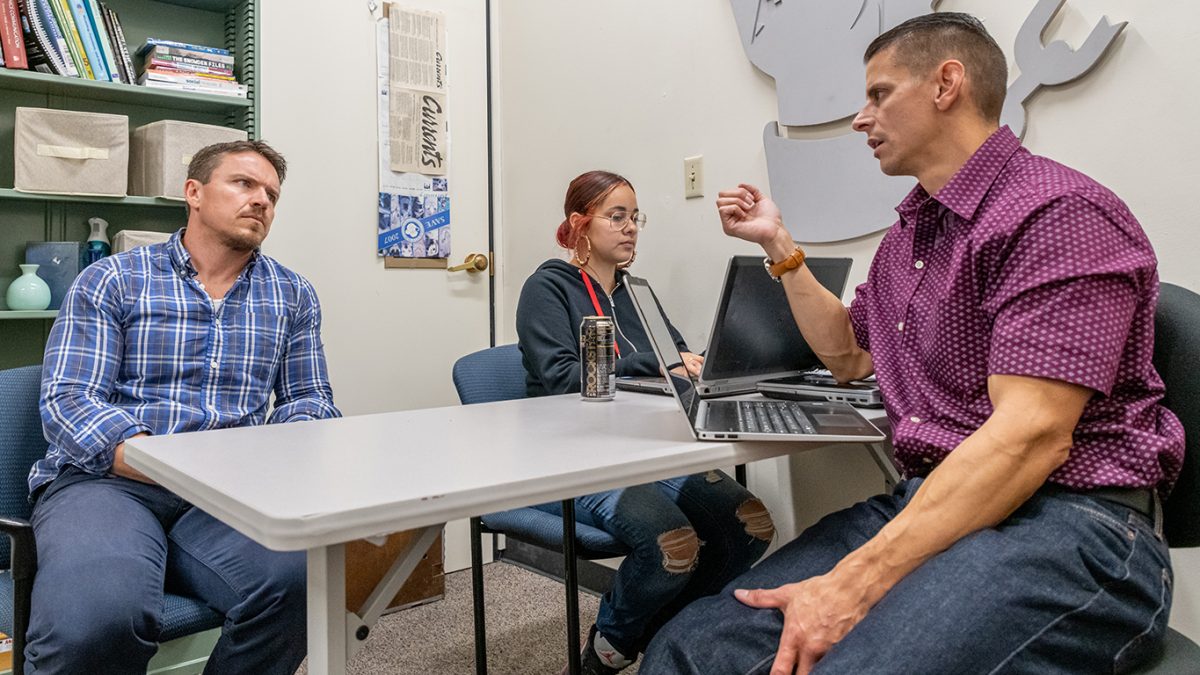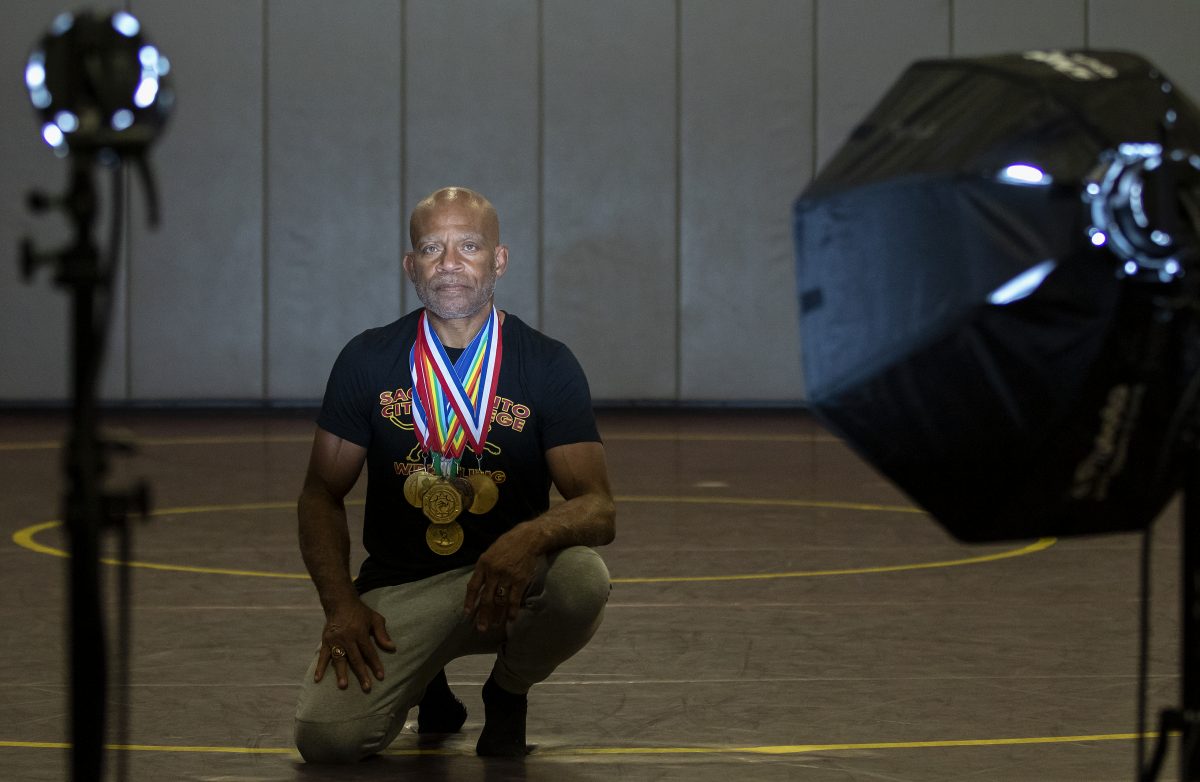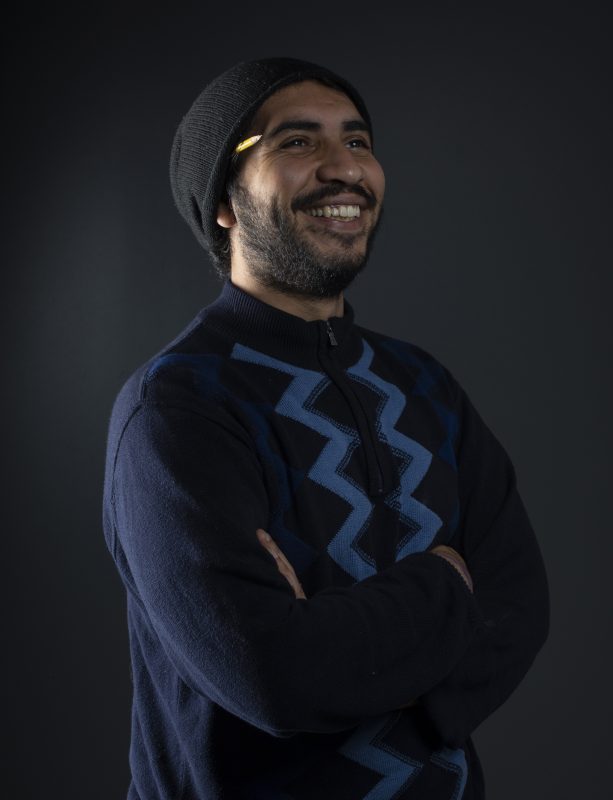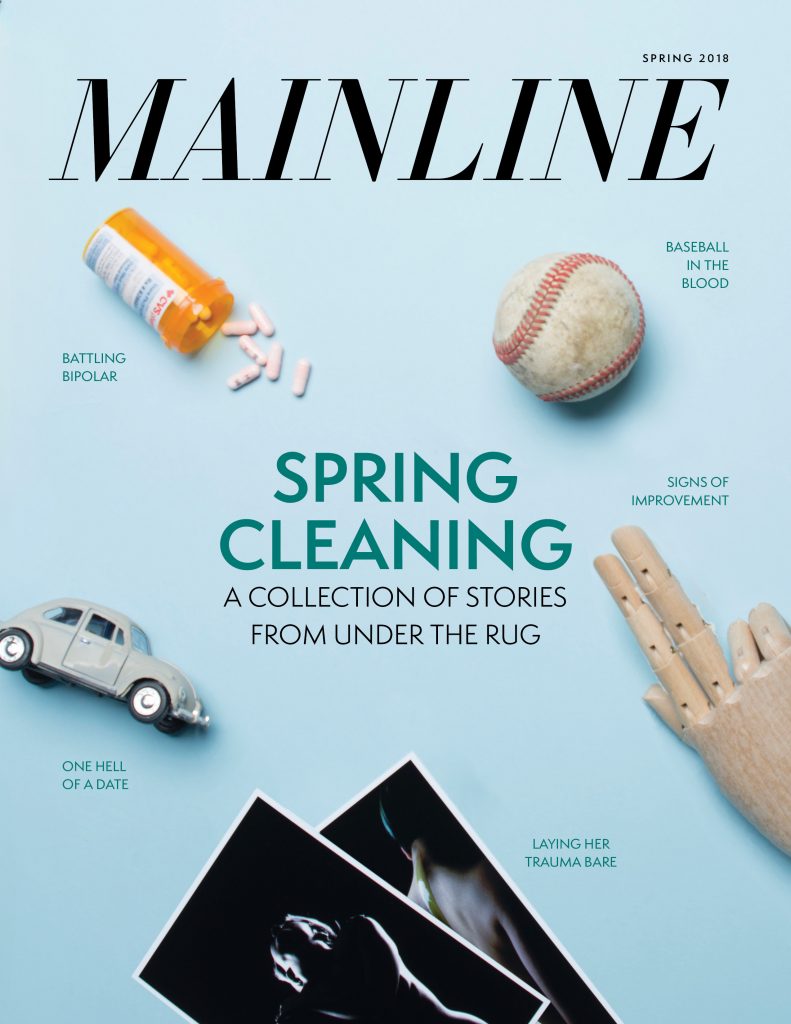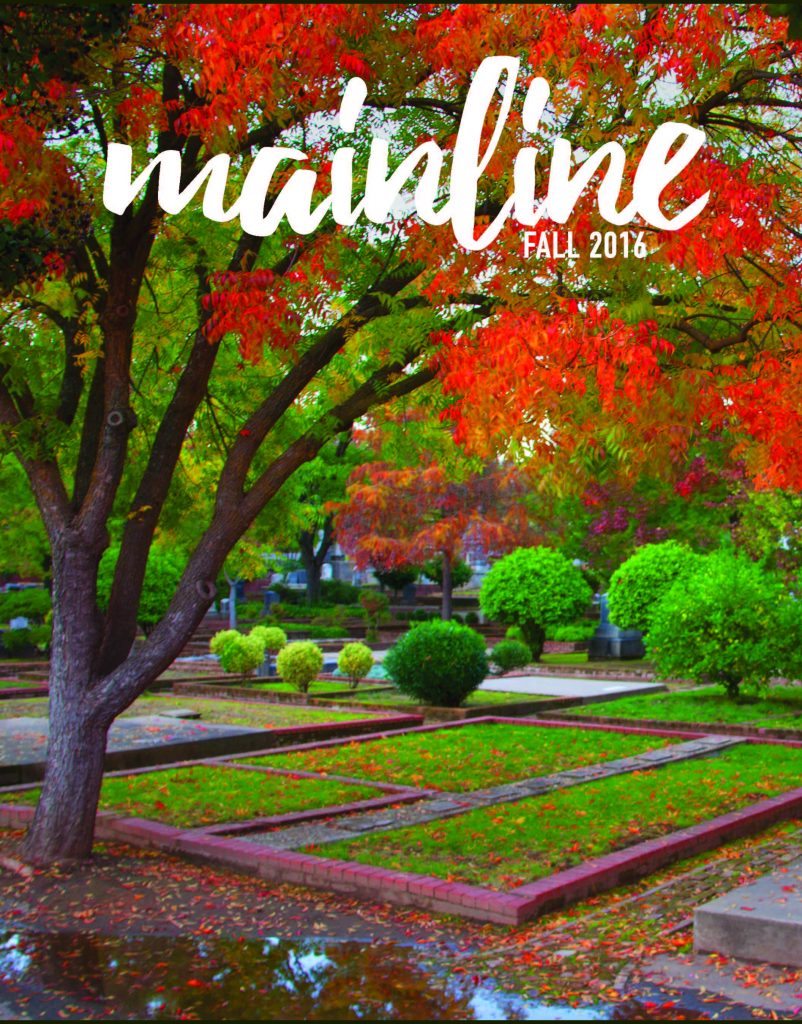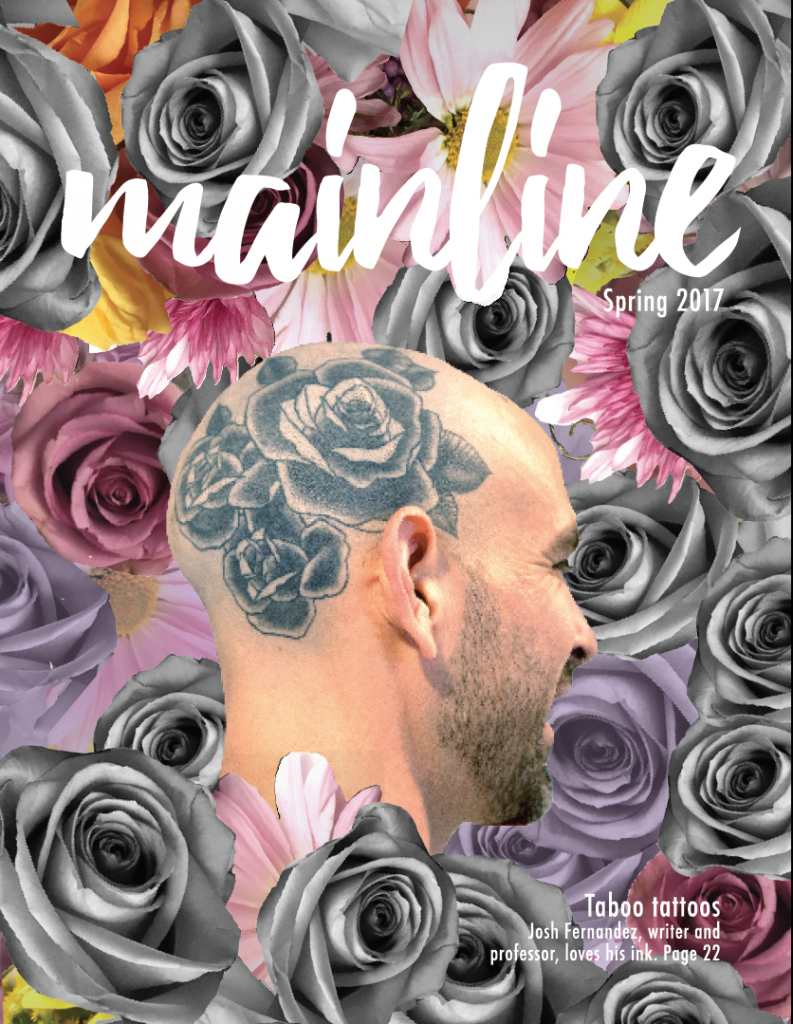
A cascade of large, rust-colored metal doors stand sentinel beneath the concrete roots of Hughes Stadium. Crimson numbers, cleanly stenciled on beige walls, label each section the doors open under. The clang of metal instruments being filed away into wall racks spills into the evening air from behind Section 9’s door.
Here a City College maintenance technician puts away his tools for the day. At first glance he looks like the perfect Hollywood response to a casting call poster that reads: “For the role of Older Asian Man.”
He appears to fit all the stereotypes: small in stature, white-streaked hair peppered with black cupping a receding hairline, thin clear-framed eyeglasses encasing small black eyes, both set shallow in a flat, thin face the color of polished brown leather.
But if given a second glance, it is clear that this man does so much more with his 68-year-old hands than just keeping City College from falling apart. He is also a talented artist, a survivor of war making the most of a second chance in his adopted country.
Known as Mr. Ly (pronounced Lee) on campus, his full name is Ly Pham, and his official title is Maintenance Technician 2. But within seconds of meeting him and shaking the sandpaper texture of his warm hand, his soft, alert eyes soaked in the wisdom of living a hard life, it is apparent that this short, wrinkled Vietnamese expatriate is so much more than his title.
“Hard to find the worker look like me,” says Pham in broken English entwined in a thick Vietnamese accent, with soft consonants rolling melodically into exaggerated vowel sounds. He pronounces “to” as “scoo.”
“Because I do everything,” Pham says with one clap of his hands as if just finishing a task. “If you have a cabinet lock problem, call maintenance, and only me build. And the door, cannot close, door close, if she drop broken, I fix everything.”
It’s easy to miss Pham on campus. Standing no taller than 5-foot-6, with a thin, wiry frame often buttoned-down in what Pham calls his “handicap-blue” maintenance uniform, he often blends into the background.
But when visitors sit in his workshop beneath Section 9 and listen, really listen, breaking through the most difficult barriers of Pham’s accent, it clear that there are many more colors than “handicap-blue” in this man’s history.
Such as the white in the beautiful marble statues of the Virgin Mary he chisels by hand at his South Sacramento home, or the deep red of Communist flags in North Vietnam, when he was held prisoner for seven years during the Vietnam War. Or the brown wood etchings of Jesus he carves and just gives away because he wants to be remembered.
“I never sell… always give away,” Pham says of his art.
His body of work ranges from chiseled pieces as small as a gray, palm-sized stone statuette to life-sized depictions of Catholic themes. The art, much like its subject matter, is immaculate. Exquisitely detailed reproductions of images imprinted into the Catholic subconscious, such as the Virgin Mary in repose while holding baby Jesus or the wooden bust of Christ during the height of his suffering.
“If I sell to you, you forget,” says Pham, “If I give to you, you remember.”
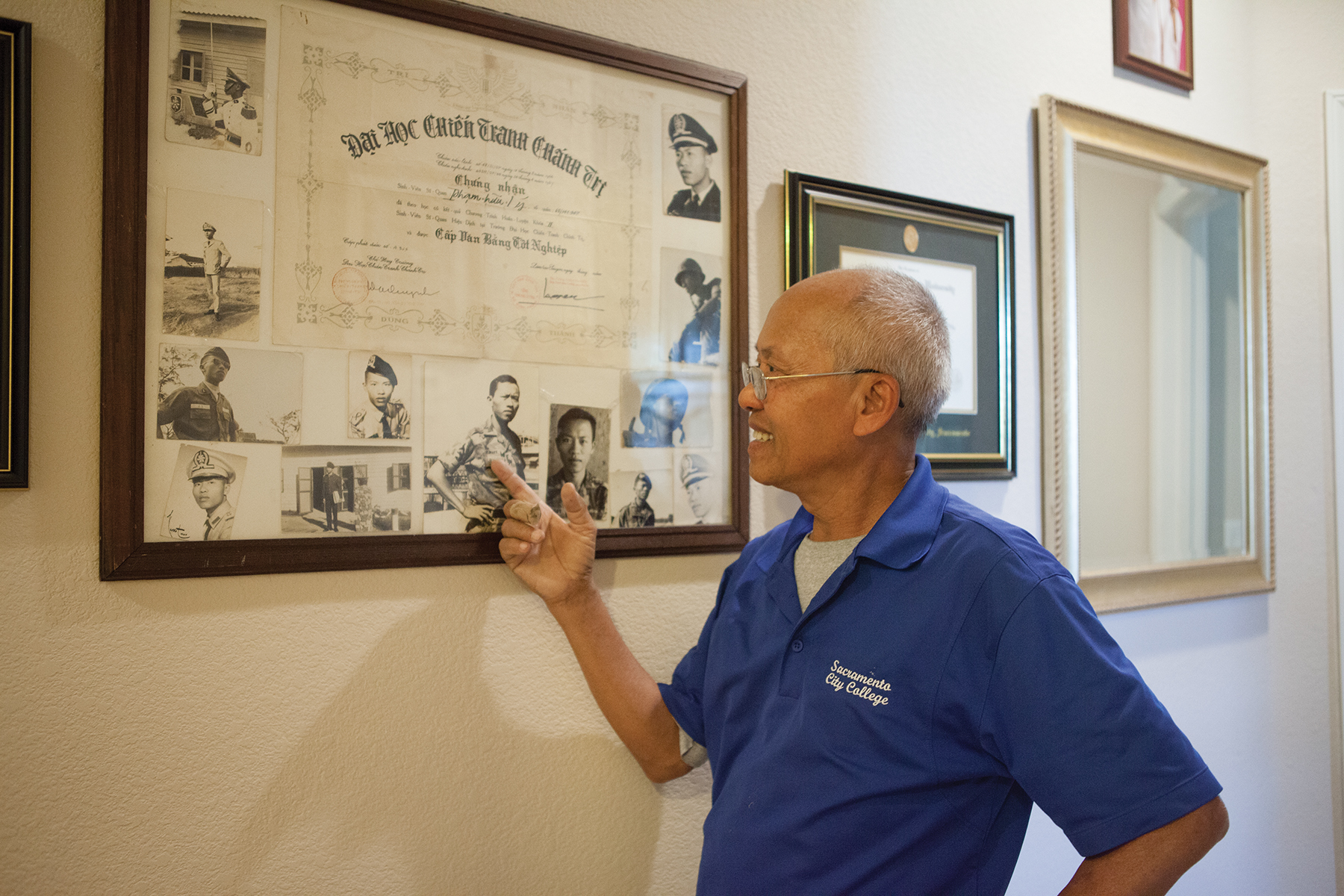
Born in the city of Hue in Vietnam on New Year’s Day 1948, Pham always remembers wanting to do art as a child. He says he would draw all the time, and in high school he learned how to carve and chisel stone and wood. He wanted to pursue his art professionally, but his mother convinced him otherwise.
His 72-year-old wife, Donna, remembers what Pham’s mother used to say about his art back when they were together in high school.
“My mother-in-law told him, ‘You study,’” says Donna in an accent similar to Pham’s. “’Not do this. Only make money when you die.’”
Pham says his mother believed that artists are always poor in life, and their work only begins to make money when they are dead. Heeding his mother’s advice, Pham kept his art as a hobby and studied political science at what he calls the College University of Law in Saigon. He enrolled in the Army in 1968, because, he says, that’s what most young men did after college.
Pham served in the South Vietnamese army as a political officer. When going into detail about his military role, Pham gives a quick history lesson of the political climate came in Vietnam during that time.
“1954,” Pham says, “Vietnam divided by two. Look like Korea.”
Pham says after the division by the Geneva Accords, North Vietnam was given to the Communists while South Vietnam was made a Republic that promoted democracy. Pham says his job as a political officer during the Vietnam War involved explaining the difference between a Communist state and a republic.
Pham says most soldiers under his command didn’t understand what they were fighting for, and it was his job to convince them they were on the right side.
“Vietnamese people not clear about what is Communist,” says Pham. “’What does that mean — Communist?’”
Pham says he would use an analogy soldiers could understand.
“[In Communism] the building is yours,” says Pham. “The government say the building is yours, but inside they control everything. I have nothing. The people have nothing. Only the bike, the bicycle. Only that is yours.”
Pham says he would often use economics to get his message across, telling the men he commanded, that in a republic, if you had money, “you buy anything you want.” But in Communism, he would say, there is nothing to buy.
“I never sell… always give away. If I sell to you, you forget, If I give to you, you remember.” — Ly Pham
Pham thought since he was just a political officer, he didn’t have to fight. But he soon found out that was a mistake.
“In the field,” says Pham. “In the, you know, battlefield. I say, ‘No, I am a political officer. I no fight.’ No! [They say] the company will kill you.”
Pham had the same training as what he calls a “professional officer.” He says he had to know how to shoot the M-16 rifle, M-60 machine gun, and how to call in mortar fire. He says the only difference between the two jobs is that, in between battles, he didn’t get a break because he had to continue to teach the soldiers about why they were there.
“Being an officer in the battlefield is very, very hard,” Pham says clearly and deliberately.
Pham says it was his value as a political officer that made him a target for the North Vietnamese. As the Americans began pulling out of the war in 1972, over the next three years, the United States stopped sending support to the South Vietnamese. Pham says gradually China and Russia began taking control over the country and he and his soldiers were afraid of being immediately shot when revealed as South Vietnamese officers. This fear, Pham says, is what led to his capture in May 1975.
“They lied,” Pham says. “They lied.”
Pham says the North Vietnamese would announce on loud speakers that any South Vietnamese who willingly turned themselves in would not only be allowed to live, but would also get to go home. Pham had three children with Donna at the time, the youngest 3 months old. The lure to see them again was too much.
Pham revealed himself as a South Vietnamese officer.
“And then they catch you,” says Pham.
“If you have a cabinet lock problem, call maintenance, and only me build. And the door, cannot close, door close, if she drop broken, I fix everything.” — Ly Pham
Pham was held prisoner in a rock quarry in North Vietnam, leaving his wife and three young children to fend for themselves. In order to survive, Donna had to think of clever ways to put food on the table.
Pham says Donna would take all the money they had and would be the first one at the markets in the morning. She would buy as much as she could and then resell it at a higher price later in the day. But, she says, sometimes it wouldn’t work
“Not freedom like here, you know,” says Donna. “Everything, of the food, government control. Sometimes police took my food. Bought and sell, you know.”
Donna says during this time, their kids would stay with Pham’s mom, the same woman who told him not to pursue art. But it was Pham’s art that helped him survive in prison for seven years.
Pham says the rations of food at the quarry were very small.
“They have a two meal,” says Pham. “The first year, a half cup [of rice]. And the second year, a little bit. And the third year, one pull. One pull.”
Pham begins laughing while telling these details.
“If you like to diet,” says Pham with a wide grin, ”you go to a North Vietnam prison. Guarantee you, after one year… 70 pounds.”
Pham used his art to get extra rations of food. He would make rings and trinkets out of stone and wood, trading them for extra pulls of rice. Pham says he got ahold of an old plastic toothbrush and would break the plastic, using the bits as jewels in his rings.
Over the years, he would hone his craft and use new tools to scratch lifelike profiles of other quarry workers on aluminum poles for more food. Those seven years in prison, Pham says, rekindled his love for art. The more art he made, the more he survived.
His mother was right. Pham was never meant to make money with his art. He was just meant to live.
(Story continues below.)
In 1982, the North Vietnamese let Pham go.
“What lessons you teach?” Pham says they would ask.
“I don’t remember,” he would answer.
After seven years of asking, Pham says they eventually believed him.
He reunited with Donna, and they had a fourth child. From 1982 to 1991 Pham worked all sorts of jobs with the skills he gained in prison.
“I work everything,” Pham says. “Carpenter. Blacksmith.”
He would even stand on the side of the road to pick up any type of job available. In 1991 his brother-in-law told him about a program in the U.S. that allowed political prisoners who were held more than three years to immigrate to America.
So Pham took Donna and their four kids to Stockton that year, and they both learned English at community college, first at Delta, then at City College. Pham was able to pivot that education into a job on campus, first as a custodian, then as a maintenance technician.
Donna also worked as a part-time custodian on campus for eight years. Their daughter worked in Admissions and Records, and their son worked as a maintenance technician with his father.
Pham never gave up his art, and to this day, he continues crafting beautiful pieces. Not for money, or for food, but just to make others happy. Pham says that’s part of his philosophy, in work and in life.
“If you happy,” says Pham, “then I’m happy.”
This story was originally written by Jonathan Taraya and published in the spring 2016 issue of Mainline magazine.
















